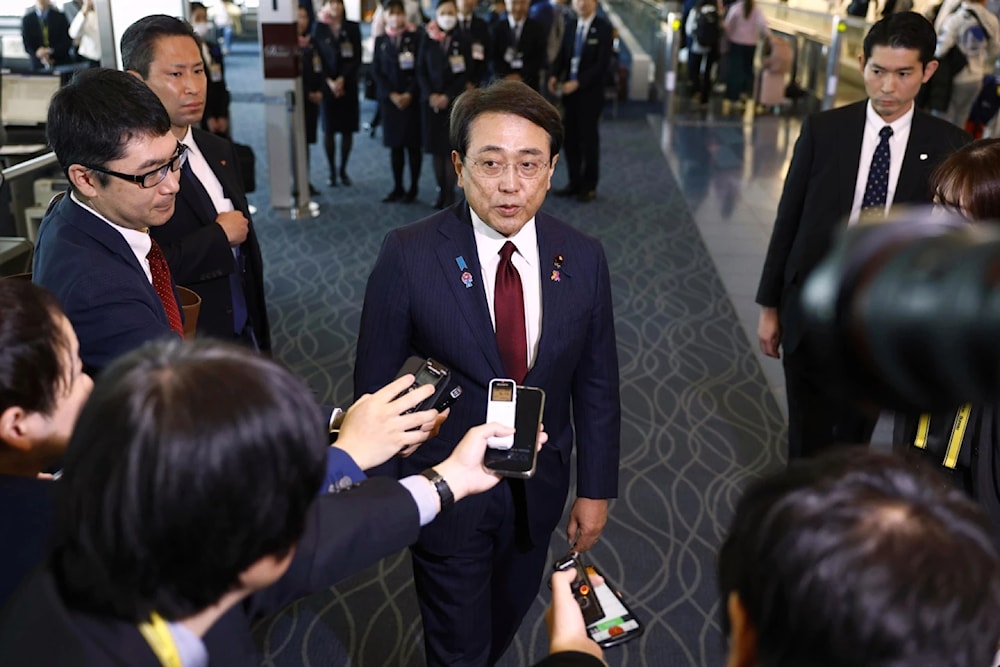Trump tariff blitz stirs worry despite 'progress' in Japan trade talks
Wall Street stumbles as Trump claims "progress" in Japan trade talks and tariff fears, inflation warnings, and global uncertainty deepen.
-
 Japan's chief trade negotiator and Economic Revitalization Minister Ryosei Akazawa, center, speaks to the reporters before his departure for the US, Tokyo, Japan, April 16, 2025. (AP)
Japan's chief trade negotiator and Economic Revitalization Minister Ryosei Akazawa, center, speaks to the reporters before his departure for the US, Tokyo, Japan, April 16, 2025. (AP)
Unease is mounting over former President Donald Trump’s aggressive tariff policies, even as he touted "progress" in ongoing trade discussions with Japan. Markets showed mixed reactions Thursday, reflecting the uncertainty clouding Trump’s trade strategy, especially as tensions with China continue to escalate.
Trump has repeatedly insisted that his tariff approach will ultimately result in better trade deals, lower foreign barriers to US products, and bring manufacturing jobs back to American soil. However, many of these negotiations, like the Wednesday talks with Japan, are playing out amid rising global friction, particularly with China, and increasing fears of economic disruption.
Federal Reserve Chair Jerome Powell warned Wednesday that the tariffs are "highly likely" to cause a short-term spike in inflation and could prompt "more persistent" price increases. He also noted the "volatility" in the markets at a "time of high uncertainty."
That warning sent shockwaves through Wall Street. On Wednesday, the Nasdaq fell over 4%, the S&P 500 dropped more than 3%, and the Dow Jones was down over 2%. Nvidia’s stock briefly plunged more than 10% after revealing steep costs tied to new US export restrictions on semiconductors bound for China.
While US markets were rattled, Asia fared better. Japan’s Nikkei rose nearly 1% and Hong Kong’s Hang Seng gained about 1.25%. World Bank President Ajay Banga echoed Powell's sentiments, saying that "uncertainty and volatility are undoubtedly contributing to a more cautious economic and business environment." The World Trade Organization Director-General Ngozi Okonjo-Iweala added that the uncertainty "threatens to act as a brake on global growth, with severe negative consequences for the world, the most vulnerable economies in particular."
China responds with retaliation
Trump’s tariff plan includes a 10% blanket tariff for most countries, but China faces much harsher duties—up to 245% on certain goods. In retaliation, Beijing has responded with duties of 125% on US goods as of yet.
"If the US really wants to resolve the issue through dialogue and negotiation, it should stop exerting extreme pressure, stop threatening and blackmailing, and talk to China on the basis of equality, respect and mutual benefit," Chinese Foreign Ministry spokesman Lin Jian said Wednesday.
China also reported a surprising 5.4% GDP growth in the first quarter, as exporters rushed to ship goods before the new tariffs took effect. But Heron Lim from Moody's Analytics told Agence France-Presse (AFP) the impact would be felt in the second quarter, as tariffs begin "impeding Chinese exports and slamming the brakes on investment."
Japan talks: 'Progress', but no breakthrough
After meeting with Japan’s top trade official, Trump posted on Truth Social claiming "big progress" had been made. However, Japanese negotiator Ryosei Akazawa’s talks with US Treasury Secretary Scott Bessent and Trade Representative Jamieson Greer didn’t result in any immediate deal.
"Of course, the discussions going forward won't be easy, but President Trump has expressed his desire to give the negotiations with Japan the highest priority," Prime Minister Shigeru Ishiba said in Tokyo.
"We recognise that this round of talks has created a foundation for the next steps, and we appreciate that," Ishiba said, before adding, "Of course there is a gap between Japan and the US."
Japanese companies are the biggest investors in the United States, but Japanese exporters are still hit by Trump’s baseline 10% tariff, as well as additional duties on cars, steel, and aluminum. Trump reportedly wants Japan to purchase more American-made defense gear and take steps to boost the yen against the dollar—though currency issues weren’t addressed in this round of talks, according to Akazawa
Stephen Innes at SPI Asset Management said before the talks that traders were "waiting to see if Akazawa can thread the needle — cut a side deal, dodge Trump's sledgehammer, and limp out with bruises instead of a shattered jaw."
Meanwhile, Indonesian officials also held trade talks in Washington on Wednesday, and South Korea’s finance minister is set to meet with Bessent next week. South Korea is a major exporter of autos and semiconductors and is watching the situation closely.
Political risks at home
While Trump's tariff strategy still enjoys support among many Republicans, it faces growing criticism domestically. California Governor Gavin Newsom, a Democrat, announced he’s launching a legal challenge against Trump’s authority to unilaterally impose tariffs, saying the policy has led to economic turmoil, rising consumer costs, and damage to families and businesses across the state.
Donald Trump does not have the authority to unilaterally impose the largest tax hike of our lifetime with his destructive tariffs.
— Gavin Newsom (@GavinNewsom) April 16, 2025
We’re taking him to court. pic.twitter.com/LAm1NRx300
Meanwhile, some lawmakers in the United States are calling for an investigation into whether President Donald Trump engaged in insider trading or market manipulation following his abrupt shift on global tariffs, a move that triggered a historic stock market rebound.
The controversy erupted after Trump posted “IT’S TIME TO BUY” just minutes after Wall Street opened on Wednesday, April 9. Hours later, he announced a 90-day suspension of additional tariffs on dozens of countries, except for China, which triggered a market rally.

 5 Min Read
5 Min Read









